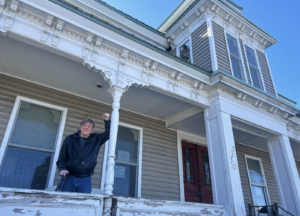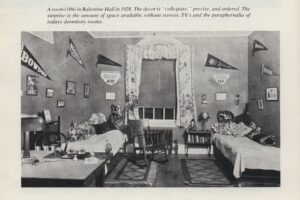When I was 18, I came to the University of Maine to get away. At the time, my father was still in the U.S. Navy as a Captain, working in Philly and driving back to our home in Massachusetts when he could. He was in the military for 27 years, which meant I was a military child my whole life. At the time, we lived in a military base, on a road called Liberty Lane. American flags flew alongside every house. At dinner, I remember talking to my parents about the University of Maine with zeal. “This is the first place I got a say in, this is the first time I chose what home is.” Dinnerware tapped against the ceramic plates. My family, thinking plenty, didn’t say a word.
This wasn’t to say I didn’t support what my father was doing. We celebrated Veterans Day at my home with pride. We’d thank our father, our father would thank our mother and both our parents would thank us, their four children. As a child, I remember being a military kid was hard. It wasn’t until I grew up that I truly appreciated all my father’s work and the experiences it gave me. For this reason, I found it fitting that I was assigned this Veterans Week article, but I found it incredibly hard to write. There are so many stories and so many people that I found wanting to thank, or talk to longer, but I didn’t have the words. Instead, I let the veterans talk to me and say what they were willing to mention.
Jessi Parent is one of those veterans. She offered to drive me out to Brewer, so I could talk to people before the Bangor Veterans Day parade started last Friday. The day before, she had just finished a speech at Brewer High School, during a Veterans Assembly. As we drove, she mentioned how she had enjoyed Veterans Week at the university, but was now glad it was winding down. This did not stop her from discussing her experiences at both the University of Maine as a student, or her ongoing service in the Air Force. “My capstone is about women in combat roles,” she began. “I say, if a woman is capable of passing all the requirements without any bars being lowered, there’s no reason they can’t be out in combat positions.”
As a teenager, Parent had been active in many sports, the most notable being wrestling, which was co-ed because she was the only girl on the team. She was also in ROTC. “You have to earn your teammates’ respect,” she mentioned. “I didn’t get teased by my [wrestling] team as much as I did by other guys. Boys on the football team would make fun of me, but you see, their coach was a friend of my father. The coach told me to come and teach a practice…when I came we were going to the tires, and the guys [on the football team] were like ‘there’s no way you can flip that,’ and I flipped it…I was exhausted by the end of [the whole practice], but I kept up [with them].”
I couldn’t help seeing the parallels her childhood experiences had to the ones she had in the military. Doing sports and exercises alongside men, Parent worked harder. “It’s not about beating them, at first, it’s about keeping up,” Parent stated. “I didn’t win every time, but there were times I did. It meant I had to work harder, but I kept up.”
When arriving at the parade, I found a young Cassidy Barnes, standing alongside her father. Cassidy Barnes was in the Army ROTC, preparing to walk alongside her entire school battalion. Her father, Glenn Barnes, talked with me about something very common among military families; being military is something that continues down for generations. “Yes, I am a veteran. So is my wife and my children,” he explained proudly. “I was in the Army, and went to the University of Maine and got my commission.”
My father, too, had followed in his father’s footsteps. My other grandfather had gone to the Naval Academy and served in the Navy during several wars, one of them being Vietnam. Unlike many at the time, he had always been proud of it. As I walked away from the Barnes family, I thought of my youngest brother, who is twelve with the dream of becoming a Naval Academy grad and an engineer for the U.S. Navy. I thought of my other brother, now 18 and his experiences dabbling in ROTC programs.
“I teach Air Force Junior ROTC,” Sgt. Anthony Campbell said. “It’s a phenomenal program. A lot of people don’t think of it like this, but it’s a leadership program above anything. We build leaders and life skills and prepare them for life outside high school.” Campbell had been in the Air Force for 27 years. Watching all the ROTC programs march and prepare around me, I couldn’t help but agree. Some were sure to join the military, but others would just get a taste and be better for it.
When I came back to the University of Maine on Veterans Day, I thought of my father and my grandfather, but also my friends who had served. The military follows you, even as a dependent. During afternoons in between classes, people can now find me chatting in the Veterans Education and Transition Services’ (VETS) office in the Union, talking to friends and acquaintances while doing homework. Over the years, I’ve learned to be thankful for veterans not on a day, or a week, but every moment. These people have served years, often in wartime, to ensure that United States of America stays protected. These people are heroes and often, it takes a long time for others to realize everything they’ve done. Sometimes, others never do.











